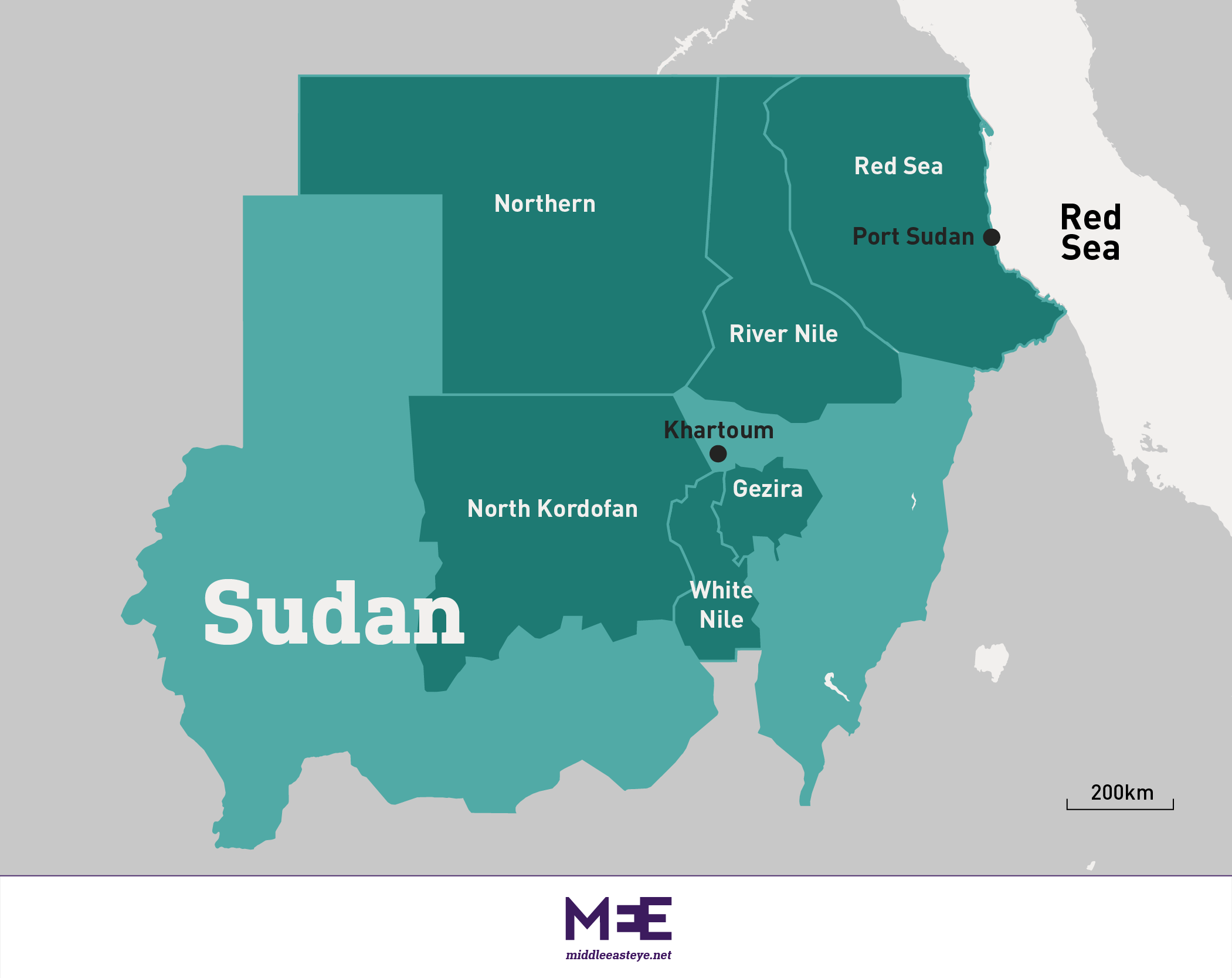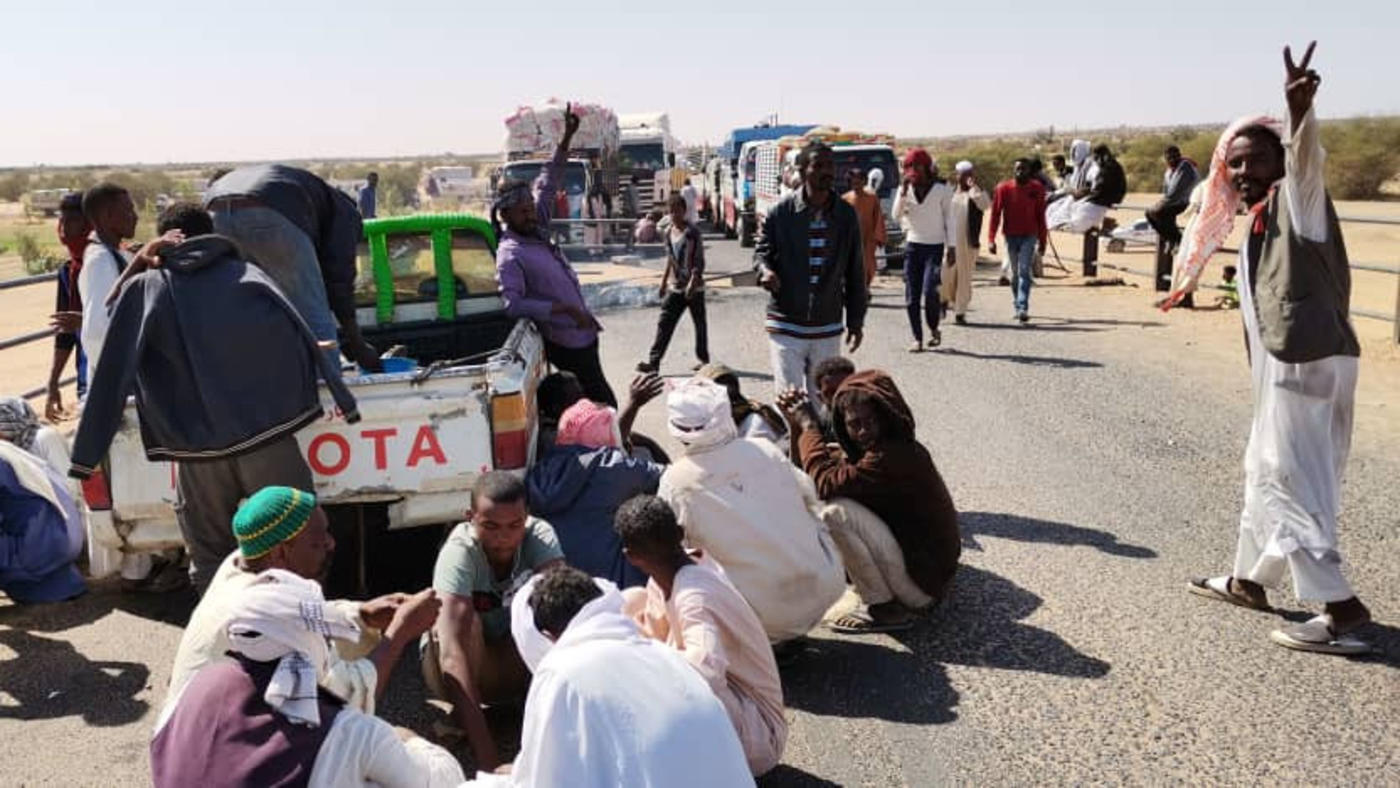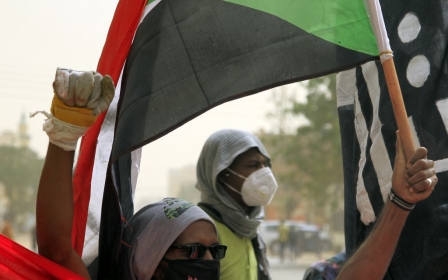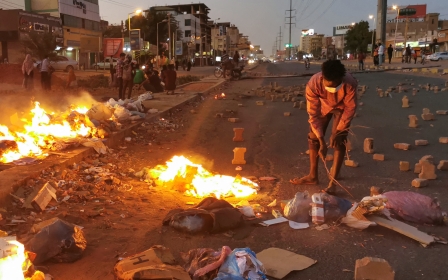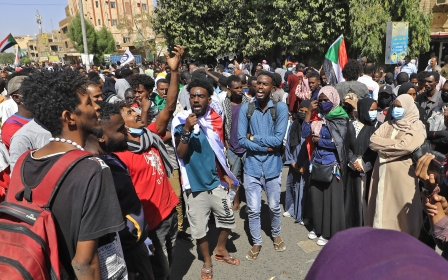Sudan: Battle of the blockades as protesters plot to choke off military rule

After a weeks-long blockade of the main highway between Sudan and Egypt, anti-coup protesters are planning to barricade strategic roads across the country in an effort to choke off resources to the military government in Khartoum.
Sudan’s military took power in a coup last October. Hundreds of thousands - if not millions - of Sudanese have mobilised to try to force them out, costing more than 80 people their lives.
Since late January, hundreds of protesters have been setting up barricades at Hafir Masho, near the Northern state capital of Dongola, and other border areas, to stop trucks exporting livestock to Egypt.
Many of the barricades and sit-ins have now been dispersed. But the protest group, who called themselves Barricades of the North, managed to stop hundreds of trucks in their attempt to bring down the leaders of the coup and “punish” the Egyptian government for supporting it.
Sudan’s resistance committees, grassroots groups of pro-democracy activists, saw the tactic as a success.
New MEE newsletter: Jerusalem Dispatch
Sign up to get the latest insights and analysis on Israel-Palestine, alongside Turkey Unpacked and other MEE newsletters
They are currently planning to barricade more key roads across the country.
“We are basically aiming at drying up all possible funding routes for the coup regime,” Mohamed Anwar, a resistance committees’ spokesperson, told Middle East Eye.
‘New tactics to defeat the coup’
The October coup plunged Sudan into an economic crisis, as western countries withdrew financial support pledged to the previous civilian-led government under former Prime Minister Abdalla Hamdok.
But despite the dire financial situation, security issues in the western Darfur region and mass protests, the military authorities have clung on.
So, galvanised by the impact of the northern road blockade, pro-democracy protesters are calling for more barricades to be erected across Sudan to isolate authorities in the capital, Khartoum.
The tactic came from ongoing discussions among resistance committees in different states for “out of the box ideas… to create new tactics to defeat the coup”, Anwar told MEE.
The plan is to isolate the capital, where roughly six million of Sudan’s 43 million population lives, from resource-rich “areas of production”, including the states of the River Nile, Gezira, White Nile and others in the east.
Protesters also want to “stop imports and exports through the seaports and roads”, Anwar added, saying the action was "in harmony with other great goals of the revolution".
These include “the rejection of the concentration of services in the capital and the export of Sudan’s natural resources,” he said, such as agriculture and livestock.
Sudanese authorities, who declared a state of emergency on the day of the coup, 25 October, have denounced the road blockades as illegal.
Battle of the blockades
Despite this, protesters have already barricaded roads from Khartoum to the states of Northern Sudan, North Kordofan and the River Nile, as well as Port Sudan, while demonstrators in Gezira - the country’s wealthiest agricultural state - blocked the road to the capital for a few hours last week.
Barricades in Northern Sudan remain in place despite violent crackdowns by authorities, according to Wail Elimam, the resistance committees’ spokesperson there.
“A battle is ongoing between the protesters and the authorities,” he told MEE. “As they broke up barricades in Alhamadab, Hafir Masho and Almutagha, others were being set up in Abri, Alburgaig, Ad Dabbah and other areas.”
'The success of the barricades in the North has inspired the protesters in different parts of the country, and that could shake the government'
- Salah Aldoma, political analyst
“We believe that the extension of the barricade and closure of the roads in other states will send a clear message to the generals in Khartoum and to their allies, not just in Egypt, but all the countries supporting the coup,” he added.
“More practically the blockade of the roads in other states will mitigate the security pressure on the protesters in Northern State as well.”
Resistance committees in River Nile have also blockaded roads linking the state with the ports on the Red Sea, resistance committee member Amar Alamin told MEE.
“Resistance committees in Atbara and Addamar cities [in the River Nile state] have decided to blockade the roads… and now the road linking Port Sudan with River Nile state and Khartoum has been cut off,” he said.
Such blockades are not a new tactic in Sudan. Sudan cancelled a contract with Philippines port operator International Container Terminal Services Inc in 2019 after workers and protesters blockaded the port.
In eastern Sudan, protesters in the Red Sea state have warned that they will do the same to stand against any attempts to lease or rent Sudanese ports to foreign companies, after reports that part of Port Sudan could be leased to Dubai Ports World.
Pro-military groups have also barricaded roads.
Last September, supporters of the former ruling party - ousted dictator Omar al-Bashir’s National Congress - from the Beja ethnic group blocked roads linking Port Sudan with the rest of the state and cut off roads in Northern Sudan, isolating the rest of the country from imports and exports.
A leading member of the Beja group, Ali Manib, said they were calling for a solution to the crisis of unfair wealth distribution and for the cancellation of the Eastern Sudan track in the Juba Peace agreement.
The peace agreement, signed in the South Sudan capital Juba in August 2020, included five tracks aimed at putting an end to decades of war that have cost hundreds of thousands of lives.
They lifted the blockade straight after the military coup.
Manib of the Beja group told MEE: “If we feel a delay [in negotiations with authorities] we will blockade Eastern Sudan again.”
Sudanese Professional Association spokesperson Walid Ali accused the Eastern tribal leaders of using the tactic to pave the way for the coup by crippling Sudan’s economy.
“There is a big difference when you use democratic tools to support democracy or to pave the way for a military coup that aims to confiscate democracy,” he told MEE.
Salah Aldoma, a political science professor at several Sudanese Universities, attributed the effectiveness of the barricades to the absence of state power and the isolation of the coup leaders.
“The success of the barricades in the north to scare the coup regime has inspired the protesters in different parts of the country to do the same,” he told MEE, “and that could shake the government.”
Middle East Eye delivers independent and unrivalled coverage and analysis of the Middle East, North Africa and beyond. To learn more about republishing this content and the associated fees, please fill out this form. More about MEE can be found here.


